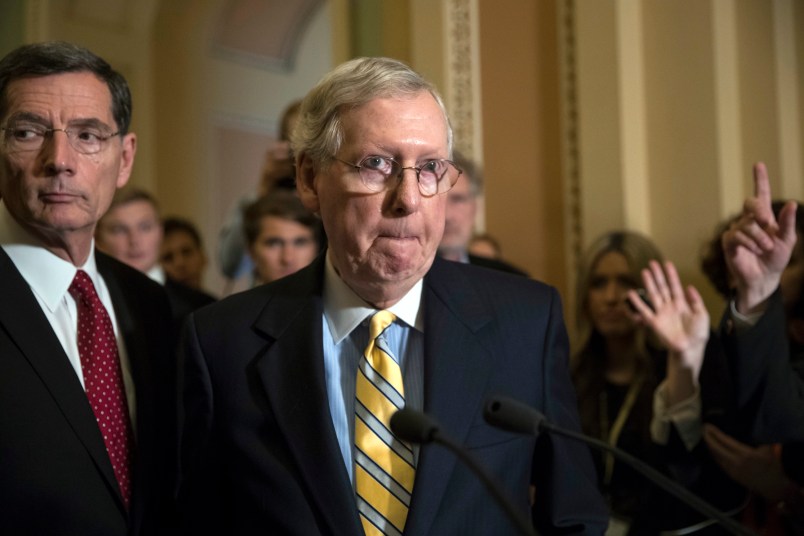The Congressional Budget Office said Thursday that a new draft of the Senate Obamacare replacement legislation would result in 22 million fewer people with health coverage by 2026, compared to current law.
By 2026, 15 million fewer people would be enrolled in Medicaid, 5 million fewer people would have nongroup coverage and two million fewer people would have coverage through their employer when compared to current law, the CBO said.
The score did not reflect any analysis of a proposal being offered by Sen. Ted Cruz (R-TX) that would let insurers sell unregulated plans because that amendment was not in the bill text submitted to the CBO its Thursday score. The coverage losses were akin to the ones predicted under the office’s first score of the Senate health care legislation, the Better Care Reconciliation Act.
Like the previous version, the latest bill imposed major cuts on the Medicaid program.
“By 2026, spending for that program would be reduced by 26 percent,” the CBO said Thursday. The latest bill would impose $756 billion in cuts to Medicaid by 2026 compared to current law. Three-quarters of those cuts would be the result of the phaseout of the Medicaid expansion, the CBO said.
The major changes the CBO was studying, compared to the previous iteration of the bill, were the retention of some of the Affordable Care Act’s taxes on high-earners, which earlier versions of the legislation would have repealed. The bill scored Thursday also included $45 billion added to opioid programs at the request of senators from Medicaid expansion states, and an additional $70 billion—for a total of $182 billion—for states to implement programs to lower health care costs for consumers.
However, the bulk of the premium decreases would be the result of the GOP bill lowering the so-called actuarial value—the percentage of the total health care costs a plan is required to pay— in benchmark plans to 58 percent, compared to 70 percent under the ACA.
“For many lower-income people, the net premiums paid in the nongroup market under this legislation would be lower than those under current law if they purchased benchmark plans, but the plans would require them to pay a greater share of their health care costs,” the report said.
The CBO predicted that by 2026, the common plan under the GOP bill would come with a deductible of $13,000.
“Because a deductible of $13,000 would be a large share of their income, many people with low income would not purchase any plan even if it had very low premiums—on net, after accounting for premium tax credits— CBO and JCT estimate,” the report noted.
The CBO found that the stability fund in the latest version of the bill would drive premiums lower than in the previous iteration. Compared to current law, premiums would rise in 2018 and 2019, due to only some of the GOP legislation’s provisions taking effect by then. Premiums would be 30 percent lower than under the ACA in 2020, and by 2026 the difference would be 25 percent, shrinking because the stability fund would not keep up with the pace of health care costs, the CBO said.
The CBO score also took into account changes to the latest Senate bill made to Health Savings Accounts, a request from conservative senators, and found that it would shift a small number of people out of employer plans and into the individual market.
The bill would reduce the deficit by $420 billion, the CBO found.
Read the report below:







22 million – seems oddly familiar, can’t quite place where I’ve heard that number before.
Oh yeah, now I remember… isn’t that the same number of uninsured as the last version of Trumpcare?
That’s not health insurance, that’s hospital insurance. As in you may go bankrupt, but at least the hospital gets paid.
Is it the same 22 million every time? Because if it is, it seems that they are just cannon fodder in this little healthcare war/tax giveaway.
First off, supposedly according to the Republicans, O-care only covers a mere 10 million people so that means 12 million people that had insurance and were happy and didn’t make use of O-care in any way will also lose their insurance. Just because I guess?
And this is the best case scenario I’m betting. The exodus will be huge and will grow exponentially.
Pretty much by removing O-care all the Repubs are doing is creating a whole new need for O-care. I guess their hope is to never let it get that far again.
What O-care needs is a lot more O and way less ®.
Finally, a billionaire I can agree with…
Billionaire GOP donor out of politics calls Trump 'abortion of a human’
“If I was the doctor and knew what that baby would do, I’d have made sure it never would have seen the light of day,” he said of the president.